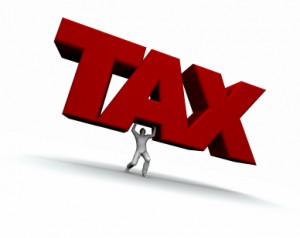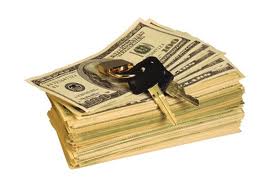A massive car tax (a ctually a collection of various taxes and fees) that was signed into law in 2007 (with no GOP support except, of course, then-Senator Abel Maldonado), billed as “temporary” at the time, is currently set to expire in 2015. Given that Californians face some of the highest levels of taxation in the entire country, it would be some welcome relief for car owners to have these taxes expire.
ctually a collection of various taxes and fees) that was signed into law in 2007 (with no GOP support except, of course, then-Senator Abel Maldonado), billed as “temporary” at the time, is currently set to expire in 2015. Given that Californians face some of the highest levels of taxation in the entire country, it would be some welcome relief for car owners to have these taxes expire.
Of course the adage “there is no such thing as a temporary tax” has reared its head — in the form of two bills, Senate Bill 11 and Assembly Bill 8. Both are similar — and both would authorize a new tax to begin in 2015 right on the heels of the expiring old one. This new “temporary” tax increase would last for seven years, and ultimately shift $2.3 billion dollars from the pockets of car owners into state coffers.
Given that Democrats enjoy “super-majority” status in the State Capitol — passing tax increases is more probable since this can be done over the objections of Republican legislators, who are pretty good at sounding the “Californians are over taxed” rhetorical bell.
So it it was particularly disheartening when in the last week for bills authored in one legislative chamber to be passed out of their “house of origin” — that the State Senate passed Senate Bill 8 on a bipartisan vote. Not only did almost every Democrat support the car tax (which was to be expected) — but five Republican State Senators voted for this big, fat tax increase. Specifically Senate GOP Leader Bob Huff, as well as Senators Anthony Cannella, BillEmmerson, Jean Fuller, and Mimi Walters. Republican Senators opposing the tax increase were Joel Anderson, Ted Gaines, Steve Knight, Jim Nielsen, and Mark Wyland. Senator Tom Berryhill did not cast a vote.
Needless to say this is profoundly disappointing. No doubt when we go into next year, as Republicans attempt to criticize Democrats for their policies, that this vote will come back in aces, with Governor Brown and company pointing to the fact that even Republicans in the Capitol believe that there are appropriate times to raise taxes.
Someone asked me once how you tell the difference between a tax and a fee. And my answer, a little tongue in cheek, is that it’s a tax increase if you voted against it, and it is a fee if you voted for it. Over at PRI’s CalWatchDog site John Hrabe has a story up all about this tax increase vote, which is worth reading. In the article he points out that Senate GOP Huff works hard to not call this a tax increase. In a piece defending her vote that was published in Fox and Hounds Daily, Senator Walters brushes off a $2.3 billion tax increase, saying that the bill “…extends several existing fees that are imposed on California residents…” — She goes on to say that she sees that extending these fees is not good public policy, but…”
So before I get to that “but” — let me be very clear. There can be a debate about whether or not the tax increase is a good idea or not — obviously I think not. But it is nonsensical to actually say that a tax increase actually isn’t a tax increase. Perhaps some of the parsing of words here is due to the fact that Senators Emmerson, Fuller, Huff and Walters all launched their legislative careers signing a written pledge to, “vote against any tax increases, and to oppose all efforts to raise taxes.”
 Huff and Walters (and presumably Cannella, Emmerson and Fuller) hang their tax increase votes on the idea that a big portion of the billions of dollars in car owner funds that are to be collected are then redistributed to thousands of California businesses hit hard by the state’s draconian AB 32 law which mandates reductions in carbon emissions. These businesses (oil, manufacturers, trucking, etc.) have employed hordes of lobbyists who have descended on the Capitol — all pretty much with the same line (h/t to Jon Coupal), “Don’t tax me, tax the guy behind the tree!”
Huff and Walters (and presumably Cannella, Emmerson and Fuller) hang their tax increase votes on the idea that a big portion of the billions of dollars in car owner funds that are to be collected are then redistributed to thousands of California businesses hit hard by the state’s draconian AB 32 law which mandates reductions in carbon emissions. These businesses (oil, manufacturers, trucking, etc.) have employed hordes of lobbyists who have descended on the Capitol — all pretty much with the same line (h/t to Jon Coupal), “Don’t tax me, tax the guy behind the tree!”
The problem, of course, is that there is always a constituency group that is looking to increase taxes to benefit themselves. The five Republican legislators who voted for SB 11 were sent to Sacramento to look out for the taxpayers. In this case, taxpayer (car owners) were ill-served. A tax that should be ending, may very well continue well into the next decade!
The good news is that AB 8 (the Assembly version of this tax increase) seems to have (at least for now) become a victim of Democrat infighting and GOP unity, and it’s unclear if that bill moves at all. Unfortunately SB 11 is now in the Assembly, and will start moving through the process. Republicans in the Assembly have an opportunity to snatch victory out of the jaws of defeat here. While they have super-minority status, a unified Republican caucus, combined with Democrat infighting, could mean that this tax increase dies in the Assembly.
If it should pass, in addition to the bad policy and politics of the bill, look for Democrats to take their queue from this — and pass more onerous regulations on business, followed by an offer to join hands with Republicans to pass broad-based tax increases…
_________________________________________________
If you are new to this issue, here’s a couple of columns to bring you up to speed…
Will Republican Legislators Betray Taxpayers? – by Jon Coupal, Howard Jarvis Taxpayers Association
Any GOP Votes For A $2.3 Billion Car Tax Is Bad Politics – Jon Fleischman

